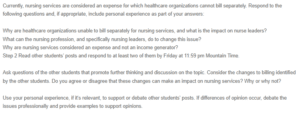Discussion – Financial Considerations in Nursing
Although an essential part of the healthcare delivery process, healthcare organizations are unable to separately bill nursing services for a number of reasons. Firstly, nursing is a basic and routine service that is considered to be a part of the room rates. This means that as the room is tabulated, it includes the cost of these basic and routine services. Secondly, most healthcare organizations utilize an integrated care model and a fee-for-service billing model. An integrated care model is an approach to care delivery in which physical care and mental and behavioral care, such as patient support, decision-making, care coordination, and case management, are coordinated (Goodwin et al., 2021). Nursing services are a critical part of teams that provide integrated care. This complicates the billing process as the charges are based on all interventions or procedures employed. Therefore, specific nursing services cannot be fragmented and charged separately. Further, integrated care models complicate the role of nurse leaders. It can make it hard for nurse leaders to manage integrated care teams, complicating funding decisions and allocation of funds for nursing care services, leading to a reduced recognition of nurses’ input in care teams.
Nursing leaders will have to invest in nursing advocacy. Nurse leaders are drivers of nursing advocacy in health policy matters (Turale & Kunaviktikul, 2019). Such leaders will need to push for the recognition of nursing services as independent and chargeable critical elements of the healthcare service delivery process. Therefore, they require policies that push for such services to be charged as independent services, thus changing the current reimbursement models.
Healthcare organizations cannot charge for nursing services directly despite having to pay nurses who provide such services. This makes nursing services to be considered as expenses rather than income generators. A major reason for this is that nursing services are provided directly to the patients in a holistic manager, making it hard to quantify related service activities. Such services are also integrated into the entire care model and billing processes; thus, the recognition of their value may not be achieved.
References
Goodwin, N., Stein, V., & Amelung, V. (2021). What is Integrated Care? Handbook Integrated Care, Second Edition, 3–26. https://doi.org/10.1007/978-3-030-69262-9_1/COVER
Turale, S., & Kunaviktikul, W. (2019). The contribution of nurses to health policy and advocacy requires leaders to provide training and mentorship. International Nursing Review, 66(3), 302–304. https://doi.org/10.1111/INR.12550
ORDER A PLAGIARISM-FREE PAPER HERE
We’ll write everything from scratch
Question 
Currently, nursing services are considered an expense for which healthcare organizations cannot bill separately. Respond to the following questions and, if appropriate, include personal experience as part of your answers:

Discussion – Financial Considerations in Nursing
Why are healthcare organizations unable to bill separately for nursing services, and what is the impact on nurse leaders?
What can the nursing profession, and specifically nursing leaders, do to change this issue?
Why are nursing services considered an expense and not an income generator?
Step 2 Read other students’ posts and respond to at least two of them by Friday at 11:59 pm Mountain Time.
Ask questions of the other students that promote further thinking and discussion on the topic. Consider the changes to billing identified by the other students. Do you agree or disagree that these changes can make an impact on nursing services? Why or why not?
Use your personal experience, if it’s relevant, to support or debate other students’ posts. If differences of opinion occur, debate the issues professionally and provide examples to support opinions.